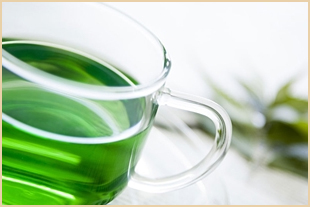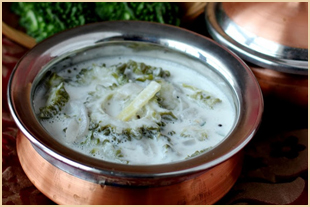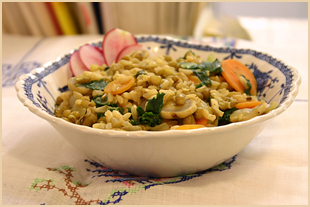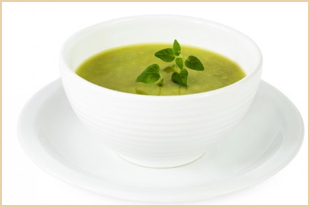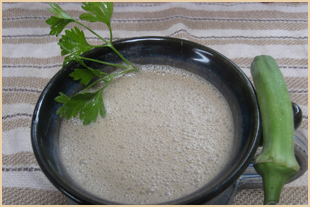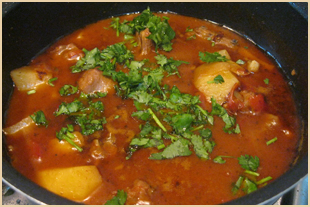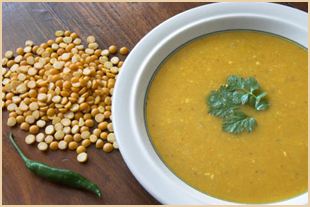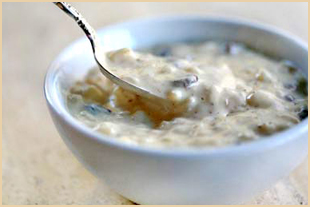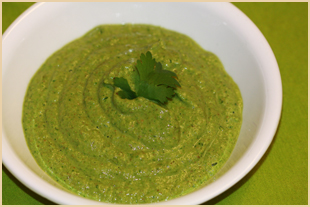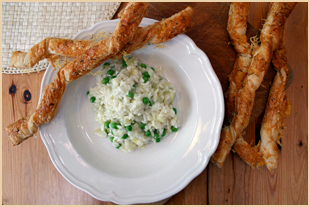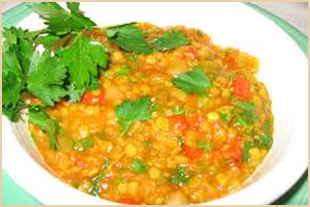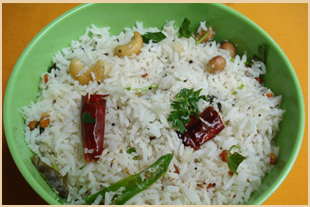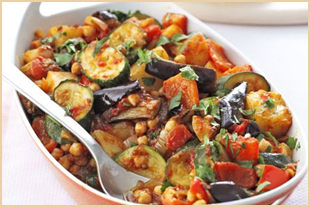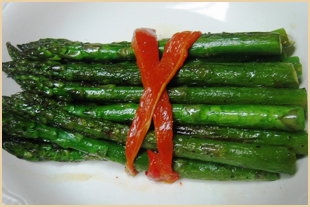Ayurvedic Beauty Tips For Skin
Beauty tips
Grate raw coconut and squeeze milk out of it. Apply this milk over your lips and face. It adds grace and glow to your skin.
Cleansing the skin
Dip a piece of cotton wool in unboiled milk and wipe on the face with it. It also cleans unseen dirt and goes down to pores.
Skin Moisturizer
-
For normal skin mix 1 tablespoon orange juice and 1 tablespoon lemon juice in a cup of yogurt, to make a paste. Apply it on face as a mask and keep it on for 15 minutes. Then clean it off with a wet tissue. This mask enhances the complexion and glow of fac.
-
For dry skin a mixture of cooked oatmeal and honey when applied on face act as a very good moisturizer and cleanser.
Preventing wrinkles
-
Application of pure castor oil prevents wrinkles and softens the skin. This also slows down the aging process
-
Home made conditioner: mix one table spoon of honey and 2 table spoon of cream. Apply this mixture on face and wash it off after few minutes. It works wonders.
-
Removing skin pigmentation and marks : Rubbing a raw potato on face removes marks and pigments.
-
Sun-screen lotion from kitchen : Prepare a homogeneous mixture of cucumber juice, glycerin and rose water .Apply this mixture on face. This mixture can be refrigerated.
Beauty secrets for naturally beautiful skin
-
Mix equal quantities of cucumber juice, rose water and lime juice. Wash the face and apply it overnight. Rinse off in the morning. This clears the complexion and keeps it healthy.
-
Take 50 ml. of raw (not boiled) milk and mix a pinch of salt and two teaspoonful of lime juice in it. Use it as a cleansing lotion. It helps to clean the deep pores of skin.
-
Mix equal quantities of lime juice, glycerin and rose water. This lotion if applied to the face regularly at bed time is very useful in removing pimples, blackheads and other stains of the skin. It makes the skin soft, and can also be applied to other parts of the body (hands, feet etc.)
-
Take 50 ml. of tomato juice and mix with one teaspoon of lemon juice. Apply this mixture to the face. It helps to make the skin soft and glowing.
-
Take equal quantities of turmeric powder and wheat flour and make a paste with sesame oil. Apply it to the face to remove unwanted hair.
-
Apply orange juice to the face for smooth and soft skin.
-
Take 30 ml. of cabbage juice and mix one teaspoon of honey in it. This mixture, if applied regularly to the face, helps to keep the wrinkles away.
-
Make a paste of raw carrots and apply it to the face. Wash it after one hour. The skin will become glowing.
-
Regular application of mint juice to the face helps to remove stains.
-
Sandal wood powder pack to rejuvenate skin
Ingredients:- Sandal wood powder ,Turmeric powder & Milk Method of preparation:- Mix all the ingredients to form a paste. Apply this as face pack. This rejuvenates the skin
Ayurvedic Beauty Tips For Eyes
-
Every morning after waking up, fill your mouth with water, close the eyes and sprinkle water on them about 10-15 times. Be sure, as Ayurveda advises, to wake up before sunrise. Do not use hot water to wash the eyes.
-
Do not wash the eyes or face when the body is sweating, especially after hard physical exercise or after being exposed to heat and sun.
-
Do not stare continuously, especially while looking at long distance objects. Blinking or giving rest to the eyes is good. Do not look at the objects in bright sunlight for a long time. Avoid reading, writing or working with eyes in improper light, or when the light is not sufficient. Take a break and give rest to the eyes if you feel heaviness or tiredness in the eyes.
-
Staying up late in the night and sleeping after sunrise is harmful for the eyes. In case of staying up late, drink a cup of water after each hour or half hour.
-
Protect your eyes from dust, smoke, strong sunlight and strong wind. Avoid staying long in such conditions. In case you have to stay, blink often and massage the closed eyes gently with your palms.
Ayurvedic Tips To Reduce Obesity
Numerous tips to reduce obesity have been mentioned in Ayurveda. The following ayurvedic tips help you to reduce the obesity.
-
Very good exercises. Exercises like brisk walking, jogging, and playing out door games etc help to reduce weight.
-
Physical and mental exertion. Exerting physically like doing house hold works, walking to distant places to bring groceries, vegetables etc, walking long distances to bring the child back from school, walking to working place, climbing stairs etc are types of physical exertion. Exerting physically as much as you can help to burn more calories. Mental exertion like worrying or involving in finding solutions to problems also restrict food consumption in some and there by reduces the intake of calories .
-
Having sex in moderate way is also a good physical exertion.
-
Consumption of honey. This is advisable for non diabetic patients. Consuming 2 tea spoon of honey with a glass of herbal tea which includes weight reducing herbs help a lot in weight reduction. Honey along with these herbs scrapes and dissolves the Kapha and medhas (body fat).
-
Sleeping for less hours. Avoiding sleeping in afternoons help to increase the burning of calories. This avoids slowing of basal metabolic rate.
-
Avoiding the food and beverages which increase Kapha and medhas. The foods which increase Kapha and medhas are sweets, sweetened drinks, large quantities of carbohydrates and oily food.
Ayurvedic Treatment For Weight Loss
-
Increase the quantity of fruits and vegetables and low calorie foods.
-
Avoid intake of too much salt as it may be a factor for increasing body weight.
-
Milk products like cheese, butter etc. and non-vegetarian foods should be avoided as they are rich in fat
-
Mint is very beneficial in losing weight. Chutney of green mint with some simple spices can be taken with meals. Mint tea also helps.
-
Spices like dry ginger, cinnamon, black pepper etc. are good for loosing weight and can be used in a number of ways.
-
Regular intake of carrot juice.
-
Avoid rice and potato, which contain a lot of carbohydrates. Among cereals wheat is good.
-
Vegetables like bittergourd and drumstick are useful in loosing weight.
-
Honey is an excellent home remedy for obesity. It mobilizes the extra deposited fat in the body allowing it to be utilized as energy for normal functions.
Dosage: One should start with small quantity of about 10 grams or a tablespoon, taken with hot water early in the morning. A teaspoonful of fresh lemon juice may also be added.
-
Fasting on honey and lime- juice is highly beneficial in the treatment of obesity without the loss of energy and appetite. For this, mix one teaspoon of fresh honey with the juice of half a lime in a glass of lukewarm water.
Dosage: Take several times a day at regular intervals.
-
Raw or cooked cabbage inhibits the conversion of sugar and other carbohydrates into fat. Hence, it is of great value in weight reduction.
-
Exercise is an important part of any weight reduction plan. It helps to use up calories stored in body as fat.
-
Walking is the best exercise to begin with and may be followed by running, swimming or rowing.
-
The gum of Commiphora Mukul called 'guggulu' is the drug of choice for the treatment of obesity.
Blood Purification and Fat Reduction
Take one glass of warm water and mix 1-2 teaspoonful of honey and one teaspoonful of lemon juice. Take this preparation daily before evacuation. It helps to purify the blood. It also helps to reduce fat and to clean the bowels.
Ayurvedic Tips for Summer Skin Care
-
Drink lot of water through the day, not only to replenish moisture lost to the heat and sweat but also to help flush toxins out of the body and keep skin looking clear and lustrous. Herb or spice tea, offer added therapeutic benefit. To balance Pitta, choose cooling herbs and spices such as mint, cardamom. Stay away from iced beverages because they hinder digestion and can create toxins leading to skin breakouts.
-
Eat Pitta-balancing fruits, vegetables and herbs, which supply the skin with essential nutrients and come with free-radical fighting antioxidant properties while they help keep your skin cool. Carrots, lettuce, celery, asparagus and leafy greens are good vegetable choices. Sweet juicy fruits such as grapes, watermelon and mangoes both nourish and cleanse. Fresh ginger, mint and basil add flavor and aromas to dishes without aggravating Pitta dosha.
-
Buttermilk is a cooling, Pitta-pacifying beverage that also supplies nutrients to your skin and helps to keep it from drying out. Drink a cup of Buttermilk every day, and also combine milk with ingredients like almond and rose water to make a Pitta-balancing skin cleanser.
-
Get plenty of quality rest each night. Keep your bedroom cool, dark and comfortable and sleep on cotton or linen sheets. Get to bed early and awaken early for clear healthy skin and sparkling eyes.
-
Pitta dosha governs the heart and emotions. When you feel stressed, angry or frustrated, your skin will show it over time as furrows and small lines and breakouts. Practice calming yoga poses or meditation to stay serene and help your body and mind manage stress. Diffuse Pitta-balancing essential oil, such as rose, sandalwood and lavender to keep mind and heart balanced. Walk on the beach or through a cool shady garden
-
Keep your skin nourished with an herbal moisturizer. Look for ayurvedic formulations that contain skin-friendly herbs such as sandalwood, turmeric, brahmi, amla and aloe vera. At least once a week, treat yourself to a fruit or vegetable mask appropriate for your skin type. Cucumbers, avocados, apricots and papayas lend themselves well to home made masks.
Remedies for hair loss
Hair loss, thinning of hair and balding is some of the common hair problems. Many of us suffer from these ailments due to our modern lifestyle and diet. Ayurveda can be very beneficial in treating these conditions as it investigates the root cause of the problem. The causes for these hair conditions are:
-
Excess of Pitta dosha in the body is the chief cause of hair problems. Pitta is increased by excessive intake of tea, coffee, alcohol, meats and excessive smoking. Pitta is also aggravated by eating too much fried, oily, greasy, spicy, sour, and acidic foods.
-
Intake of too many chemical medicines, low blood circulation, anemia, and general weakness after disease, stress, anxiety, and mental tension are also prime causes of hair loss.
-
Chronic diseases like typhoid fever, presence of dandruff or lice and hormonal imbalance also cause hair loss.
So watch out carefully for these reasons! You may be overdoing one of them, and thus losing your beautiful hair.
Treatment
-
The first step is to locate the root cause in your diet or lifestyle that may be increasing the Pitta dosha. Once you locate it, try to give up or at least reduce the diet, habit, or activity responsible for increasing Pitta.
-
Always use a natural shampoo or soap to clean the hair. As most soaps and shampoos have chemicals, they might be the cause of your problem. Usually the chemicals have a heating effect, and increase Pitta locally. Amla (embilica officinalis), Shikakai (Acacia concinna) are very commonly used in India for washing the hair.
-
Oiling and massaging of scalp is very beneficial for stopping the hair loss. Use Neelibringadi coconut oil or kayyonnyadi oil at least three times in a week. Also medicated oils like 'Mahabhringraj oil ',' Amla oil and 'Arnica oil' are very useful. Put oil on the scalp, and massage gently in the roots of the hair.
-
The person should maintain a regular bowel movement everyday. In case of constipation, a mild natural laxative can be taken. Triphala, an Ayurvedic herbal powder, is also useful.
-
The diet should contain more green leafy vegetables, salads, milk, fruits and sprouts. Take more proteins, milk, buttermilk, yeast, wheat germ, soybean and vitamin A.
-
Regular physical exercise is very beneficial as it helps in balancing the aggravated doshas.
-
Rub your scalp vigorously after washing the hair. It increases the blood circulation, and activates the sebaceous glands.
-
Daily application of coconut oil mixed with lime juice on the hair is also beneficial.
For Balance, Well Being, Weight Management
-
Use freshly prepared natural foods, made with wholesome grains, herbs, vegetables and fruits. Make home made vegetable broth and use it in your cooking instead of heavy oils or dairy products. For optimal digestion, reduce or eliminate the use of meats in your diet.
-
Chewing aniseeds or fennel seeds with coconut powder or cardamom seeds with sugar after a meal encourages the secretion of saliva and aids digestion. The mouth becomes refreshed and one feels joyful.
-
Include all the six tastes, sweet, salty, sour, bitter, pungent and astringent in all the meals, to create natural and nutritional balance and decrease cravings in between meals.
-
Certain foods are healthy when consumed alone, but when taken in combination with other foods, generate harmful chemicals in the body. (For example radishes or cucumbers should never be taken with water.)
-
Eating food at regular time each day is helpful in regulating the chemicals in the body.
-
Resting after lunch and walking after dinner is helpful.
-
Regular use of milk, yogurt, cheese or cream is good for one's health.
Benefits of Honey
Eyesight : Regular use of honey mixed with the carrot juice helps to improve the eyesight. It should be taken one hour before meals in the morning.
Cough : Mixture of equal quantities of honey and ginger juice is a good expectorant. It gives immediate relief in symptoms like cold, cough, sore throat, congestion of chest and runny nose.
Asthma : Mix half a gram of black pepper powder with honey and ginger juice mixture (equal quantity). Take this mixture at least three times a day. It helps to cure asthma.
Blood Pressure : Take one teaspoonful of garlic juice mixed with two teaspoonful of honey. It can be taken twice a day in the morning and evening. Regular use of this mixture is beneficial for high blood pressure.
Extra fat puts a strain on the heart, kidneys, liver and the joints such as the hips, knees and ankles and thus, overweight people are susceptible to several diseases like coronary thrombosis, high blood pressure, diabetes, arthritis, gout, liver and gall bladder disorders. Chief cause of obesity is overeating, irregular eating habits and not following the rules of eating or mixing non-compatible food items in one meal.
To decrease weight and get rid of obesity three things must be kept in mind :
-
Controlling eating habits.
-
Regular exercise.
-
Avoiding the causes of weight gain
Heart Tonic
One teaspoonful of anise powder mixed with one or two teaspoonful of honey acts a very nice tonic for the heart. It strengthens the heart muscles and improves its functions.
Take 2-3 dry dates and soak them in water every morning. In the evening boil them in 250ml milk until half the quantity of milk remains. Cool and add one teaspoon honey as a sweetener. Eat the dates and drink the milk. This can be taken one hour before going to bed. Do not drink water for 2 hours after taking this tonic. This tonic helps to build all the 'Dhatus', gives strength to lungs, increases blood circulation, cleans the bowels and alleviates Vata and Pitta.
Ayurveda diet and recipes
Introduction
Ayurveda has its roots in India, dating back to about five thousand years. Essentially, it is a science that encompasses the health benefits of herbs, meditation, yoga, and massage. Ayurveda is based on the principle that every being on this earth, be it animate or inanimate, is the outcome of five basic elements, or Pancha Mahabhootas - Water, Air, Fire or Energy, Earth, and Sky. Ayurveda embodies the methods that help to achieve a balance between the body, mind and soul, which is absolutely crucial to stay in unison with nature.

Ayurvedic Diet and Nutrition
According to Ayurveda, 'We are what we eat'! This ancient branch of science believes most of the common ailments are a result of poor nutrition. Ayurvedic nutrition is concerned importantly with the dietary requirements of individuals. Any anomaly in the body is thought to emanate in the digestive system, and therefore it become crucial not to cast aside even minor digestive complaints, as it could be indicative of a disease.
Ayurveda does not distinguish between food and medicine, the underlying belief that the absence of nutritive food or diet causes disease in the body. This can only be remedied with appropriate food, which becomes the medicine to heal the body of its ailment. All the same, Ayurveda holds sacrosanct, that each one of us are distinct, and our health is determined by our attitude and response to the conscious and unconscious inputs in life that one is subjected to.
Ayurvedic diet is centered on treating life's experiences as 'food' (for the body and the mind), which is assimilated into the body and contributes to its nourishment. This transformation of 'food' into nutrition is termed as 'Agni' or fire, which forms the edifice upon which the Ayurvedic system is built.
Spices and herbs form an integral part of Ayurvedic healing, mainly because of its power to be easily absorbed in the body. On the one hand, this enhances the digestive capacity of the body and on the other, cleanses it of its toxins, ensuring the cells in the body are empowered with the nutrition available in the diet. Ayurveda recommends that spices be consumed only after they are cooked.
An Ayurvedic diet is rich in vegetables, fruits, whole grains and fibrous food, which contribute to keeping the body energetic, glowing and in good health. An Ayurvedic diet is miserly with salt to prevent potential fluid retention and also discourages the intake of coffee, sodas, and alcohol.
Benefits of an Ayurvedic diet
-
Ayurvedic diet is low in fat and helps to maintain an optimum body weight.
-
Ayurvedic diet is endowed with minerals that charge the body with energy and radiance.
-
Ayurvedic diet is rich in vegetable proteins that are quickly digested and assimilated into the body.
-
Ayurvedic meals are easy to digest due to the inclusion of spices - garlic, ginger, cumin, cayenne, and black pepper.
-
Fresh organic foods that Ayurveda relies upon, are high on nutrition, and endow the body with strength and vitality.
Recipes
Ayurvedic / HerbalTea
Ayurvedic Tea is a healthy and medicinal beverage or drink, what ever you call it :), which is surely effective and helps in the balancing of digestive system.
Ingredients
Cumin - 1 tsp
coriander seeds - 1 tsp
fennel seeds - 1 tsp
Water - 3 cups
Honey to sweeten
Directions :-
Boil water, remove from flame and soak the ingredients, except honey, in it for about 5 minutes. Extract the liquid content, add honey to sweeten and serve. This ayurvedic tea is ideal for digestion and is very healthy too..
Herbal Tomato Soup
A remedy to prevent sinus allergies.
Ingredients
2/3 Tomatoes
½ fresh piece of ginger
1 tablespoon Ghee
½ tablespoon Cumin seed
3-4 pepper corns
salt
1 tablespoon of sugar
Grated coconut.
Directions :-
Heat the ghee in a saucepan and add the pepper corns, cinnamon stick, cardamom, cloves and cumin seeds. Cook for a minute and add the tomato purée, salt, sugar. Boil for 5 minutes at low heat. Add grated coconut as garnish..
Bitter Gourd In Milk Of Coconut
Bitter gourd is an ideal ayurvedic medicine for diabetes. This is an ayurvedic recipe using bitter gourd and coconut milk
Ingredients
Medium sized bitter gourd - 1
Ghee - 1 tbsp
Mustard seed - 1 tsp
Urad dal - 1 tsp
Turmeric Powder - 1/2 tsp
Cumin Powder - 1/2 tsp
Thick coconut milk - 1/2 cup
Water - 1/2 cup
Rock salt to taste
Curry Leaves - 6 to 8 sprigs
Directions :-
Trim the gourd, cut it into 2 and remove the seeds. Slice it thinly. Mix the coconut milk with water to make it thin and keep aside. Boil some water with salt and blanch the bitter gourd in it. Take it out and drain. In a heavy bottomed pot, heat the ghee until it becomes clear. Add the urad dal and brown mustard seeds to this.Saute till the dal turns golden brown and the mustard seeds start popping. When ready add the groud, turmeric powder, cumin powder and salt. Mix well. Now to this add the coconut milk. Also crush the curry leaves and add to this. Simmer till heated enough and serve hot.
Kicharee Recipe
Try eating kicharee regularly: it is easy to digest, very nourishing and delicious with our hemp seed oil
Ingredients
1/3 cup split mung dal
2/3 cup basmati rice (or other grain)
3-4 cups of water (a ratio of 1:3 or 1:4).
Directions :-
Simmer the mung dal and rice in the water. Add all the herbs and then the vegetables. The best practice is to cook it on a very low heat in a covered saucepan and DO NOT stir it after all the ingredients are added or it will go mushy.
Stir in a teaspoon of ghee or hemp seed oil at the end.
Water Retention Reducing Soup
Ingredients
50g barley
200g asparagus
Bunch fresh coriander
1 tsp fennel seeds
No salt
Simmer for 1 hour
Helpful for reducing water retention, fluid accumulation and easing urinary difficulty.
Seasonal vegetables: spinach, peas, or seaweeds, shitake mushrooms for an all round healing, healthy and agni enkindling meal.
Immune Tonic Soup
Ingredients
20g of Shatavari (Asparagus racemosa)
20g of Amla (Emblica officinalis)
6 Shitake Mushrooms
Simmer in 3 pints water- 1/2 hour
Extract Amla and Shatavari
Add 1/2 cup organic pearl barley
Add root vegetables: Beetroots, carrots, potato
Add leeks, onions garlic
Add Seasonal greens- kale, spinach, nettles
Add ginger, rosemary, thyme, turmeric
Add 1-2 sticks kombu/ wakame
simmer for 45 mins
Adjust quantities and water as desired
Add any particular favourite vegetables or herbs
Eat broth in convalescence
Eat 1-2 x/ week for general immune tonification
Benefits digestion, allergies, fatigue, inflammatory conditions etc
Basic Curry Recipe (Serves 4)
Ingredients
3 tbs virgin coconut oil or ghee
1 tspn each of cumin, coriander, fennel seeds, mustard seed
1 inch piece of freshly chopped ginger
Pinch of asafoetida
Two to three vegetables of your choice, chopped (adjust quantity as needed, but approximately 300-400g of each type)
Cumin, turmeric and cinnamon to taste
Coconut milk or yoghurt, optional
Directions :-
Heat the oil or ghee in a large pan. Fry the cumin, coriander, fennel and mustard seeds in a high heat until brown and releasing a delicious smell. Other spices, as required, can be used. Add the ginger and asafoetida. Add chopped vegetables. Sauté until the vegetables are coated in the spiced oil. Add a little water and simmer on low heat for about 15 minutes or until done. Add cumin, turmeric, cinnamon powders to taste. Add any 'quick-to-cook' vegetables such as spinach and peas at the end for 3 minutes. You can also add coconut milk or yoghurt to make a creamier sauce.
Basic Dhal Recipe (serves 4)
Ingredients
200g lentils
2 inches washed seaweed (kombu)
1 tsp cumin powder
½ tsp turmeric powder
1 tsp each of cumin seed, fennel seed and mustard seed
1 inch of freshly chopped ginger
One onion, chopped and 1 clove garlic optional
3 tbs ghee or virgin coconut oil for frying
1 pinch salt
Directions :-
Handful, fresh coriander Coconut milk or yoghurt, optional Wash the lentils and simmer them in pan for 40 minutes with some washed seaweed, the cumin powder and turmeric powder. In a separate pan heat the ghee or oil and fry in high heat the cumin, coriander, fennel and mustard seeds until brown and releasing a delicious smell. Add the ginger and asafoetida. (Onions and garlic can also be fried after the spices to make a more nourishing dish.) Pour this spiced oil into the lentil mixture (dhal). Add a pinch of salt and the fresh coriander. Coconut milk or yoghurt can be added as desired.
Rice Pudding Elixir (Serves 2)
Ingredients
100g rice pudding rice (You can also try with black or red rice)
I litre of cow's, almond or rice milk (option of more)
3 tbs almond powder
7 strands of saffron
5 cardamom pods
Rose Jam
Ghee, Virgin Coconut oil or honey, optional
Directions :-
Place the rice in a heavy pan and add the milk. Bring to boil and simmer for 1 hour. Add the almond powder. Add more milk as desired. (coconut milk is an interesting change). Soak the strands of saffron in a tablespoon of milk for 10 minutes to extract its golden pigment and then add to rice pudding. Add cardamom and rose jam. Serve and add ghee, virgin coconut oil or honey as desired.
You can also add grated carrots or beetroots to this recipe for a colourful and nourishing variation.
This is a very nourishing food for reducing vata and pitta, strengthening the tissues and building reproductive tissues.
Chutneys
These are very useful to accompany a meal to stimulate agni, reduce ama and facilitate digestion. They are a great complement to a tridoshic meal where members of a family have different dietary needs. This way a simple balancing meal can be prepared and then specific dosha regulating chutneys can be added as needed.
Ingredients
-
1 inch fresh ginger, juice of 1/2 lemon, a pinch of rock salt: enkindles agni, regulatesvata, for irregular digestion
-
1 inch fresh ginger, 1 tablespoon of mint, 1 tablespoon of coriander: enkindles agni, reduces pitta, for excessive digestion
-
4 tablespoons roasted desiccated coconut, juice of ½ fresh lime, 1 inch of fresh ginger, a pinch of rock salt: enkindles agni, reduces pitta and vata
-
1 tablespoon fresh horseradish, ¼ teaspoon dry ginger, 1 teaspoon fresh rosemary: enkindles agni, reduces kapha, for sluggish digestion (manda agni)
Hot Milk Recipe
Ingredients
1 cup almond or rice milk 2 tsp organic almond powder 2 cardamom pods 5 strands saffron. pinch of nutmeg
Directions :-
Heat the above ingredients and add 1 tsp honey.
Take with 2 capsules of organic Ashwagandha at night for a restful sleep.
This helps to nourish the nervous system, reproductive system and helps you sleep. Pure Bliss
Sunny Coconut Fennel Flapjacks
Ingredients
200g rolled oats
100g virgin coconut oil
50g maple syrup
50g sunflower seeds
50g dessicated coconut
2 tablepoons fennel
Directions :-
Melt virgin coconut oil over a low heat. Remove from heat and add rolled oats, maple syrup, coconut, sunflower seeds and fennel seeds. Place in oiled baking tray. Heat at 200C for 20-25 mins. Allow to cool, Divide. Share.
Coconut Lentil Lime Dhal (Serves 3-4 People)
Ingredients
250g split mung lentil (or any other lentil)
440ml coconut milk
4 tablespoons virgin coconut oil
6 spring onions
1 inch finely chopped fresh ginger
1 bunch coriander
10 peppermint leaves
1 lime
4 keffir lime leaves
2 tsp ground coriander seed
Directions :-
Fry the ground coriander, fresh ginger and spring onions in the virgin coconut oil. Stir in the washed lentils and simmer in 250ml water for 20 mins. Add coconut milk and simmer for a further 20 minutes. Take off heat. Add grated peel of lime, juice of lime, finely chopped kefir lime leaves, coriander leaves and mint leaves. Add a pinch of salt. Leave to stew for 15 minutes. Serve with rice or noodles.
Coconut Rice (2-3 People)
Ingredients
100g basmati rice
200ml coconut milk
50g dessicated coconut
2 tablespoons virgin coconut oil
Directions :-
Soak rice for 2 hours. Rinse rice thoroughly. Add to a good heavy saucepan and pour in the coconut milk. Bring to a simmer and stir well once. Add the saucepan lid and turn down to the lowest heat. Simmer for 10 minutes. Take off heat and add the virgin coconut oil. Leave to steam in its own aroma for 5 minutes and serve to delight. Lightly roast the dessicated coconut and sprinkle over each portion.
Golden Delicious Spicy Roast Orange Vegetables In Coconut Oil
Ingredients
1 butternut squash cut into 1 inch chunks
2 carrots cut into 1 inch rounds
3 sweet potatoes cut into 2 inch wedges
2 tablespoons cumin
2 tablespoons coriander
2 teaspoons chilli flakes
4 tablespoons virgin coconut oil
Directions :-
Grind the spices and blend together. Melt coconut oil and add vegetables so that they are coated in the oil. Add the crushed spices and a pinch of salt. Roast in an oven at 220C turning after 20 minutes until golden delicious after 40 minutes.
Braised Asparagus In Coconut Oil
Big fresh bunch of asparagus 4 tablespoons coconut oil
Wash and then tail the fibrous stems of the asparagus. Warm the coconut oil in a pan and add a dram of water (about 4 tablespoons). Add the asparagus. Pop the covered pan into an oven. Braise in the oven for 20-30 minutes until caramelized. Add a pinch of salt or seagreens and enjoy.
Try this with courgettes or endive as well
Hemp Ginger Salad Dressing
Ingredients
75ml hemp seed oil
The juice and rind of 1 lemon
Pinch of salt and pepper
1 inch of fresh ginger
A handful of fresh parsley
Shake well
1 inch of fresh ginger
A handful of fresh parsley
Shake well
(To make a lighter dressing add some olive oil)
Hemp coconut butter
30% hemp seed oil
70% coconut butter
As coconut is solid between 10-25°C you can store in the fridge and use as a spread on bread, cooked potatoes or vegetables.
Hemp with vegetables and roasted seeds
Lightly steam a bunch of asparagus and a broccoli head.
Toast some pumpkin seeds and walnuts. Add a bit of tamari as they cool.
Mix ingredients together and add 2 tablespoons hemp seed oil.
Add a sprinkle of paprika, salt and pepper to taste
Vata Diet
Use this diet to help relieve nervous tension, cramps, pain, anxiety, insomnia, bloating, constipation, dryness
General Treatments :
-
Please just eat what is appropriate for you. If you are intolerant of any food or simply do not like it then please avoid it. This diet is to help raise the digestive fire and enhance the assimilation of nutrients which will help calm the nervous system.
-
Emphasise foods that are warm, soupy and easy to digest.
-
Eat at regular times.
-
Eat to less than full.
-
Practice relaxation.
-
Avoid yeast, refined sugars, coffee, tea, tobacco, drugs, poor quality oils and extremely spicy foods as these aggravate the digestion and the nervous system.
-
Favour foods that are warm, heavy, and oily as these nourish the nervous system.
-
Reduce foods that are cold, dry, and hard as these aggravate digestion.
-
Favour foods that are sweet (e.g. wheat, milk, rice), sour (e.g. vinegar, yogurt, umeboshi plums, citrus fruit), and salty as these are all nourishing.
-
Reduce foods that are very spicy, bitter (e.g. coffee, chillies, green leafy vegetables), and astringent (e.g. apples, beans) as these aggravate digestion and disturb the nervous system.
Dairy: all dairy products nourish the nervous system. Always boil milk before you drink it, mix with cardamom seeds and drink it warm. Don't take milk with a full meal or with fruit. Use organic milk. If allergic substitute with almond or rice milk. Avoid ice cream, powdered milks and soya milk.
Sweeteners: all sweet flavours are good for nourishing the nervous system. Reduce refined white sugar. Avoid all sugars if bloating is present.
Oils: all oils reduce dryness and nourish the nervous system. Emphasise Flax, hemp, sesame, ghee, olive, sunflower, evening primrose, borage and fish oils. Use these internally and externally.
Grains: rice (basmati, brown, wild), wheat, oats (cooked) and quinoa are very good for nourishing the nervous system. Amaranth is ok. Reduce intake of barley, corn, millet, buckwheat and rye as these are a bit drying and can be difficult to digest creating wind. Avoid the rest
Fruits: favour sweet, sour, or heavy fruits, such as berries, bananas, avocados, grapes, cherries, lemons, limes, fresh figs, peaches, melons, plums, pineapples, mangoes, and papayas. Cooked apples and pears are ok. Soaked prunes and raisins are ok. Avoid dried fruits, uncooked apples, pears, pomegranates, cranberries as these can create wind.
Vegetables: asparagus, beets, cucumbers, carrots, and sweet potatoes are the best. Peas, green leafy vegetables, celery, summer squash, winter squash, and potatoes are best well cooked in oil or ghee with mild spices. Seaweeds are very beneficial. It's best to avoid the Brassica family; brussel sprouts, broccoli, cauliflower and cabbage. Also avoid Solanaceae family; peppers, aubergines, potatoes and tomatoes. Raw vegetables, especially onions are banned as these all create wind.
Spices: Most of them, especially; asafoetida, cardamom, cumin, coriander, ginger, fennel, dill, cinnamon, salt, cloves, mustard seed, black pepper all help reduce gas and spasms in the digestive system.
Nuts: all nuts and seeds are good in moderation, especially soaked.
Beans: avoid all beans, except for marinated tofu and mung lentils and occasionally red lentils.
Meat and fish: chicken, turkey, eggs and seafood are fine; beef should be avoided.
Pitta Diet
Use this diet to help clear skin inflammations, itching, joint pain, hot flushes, acidity, ulcers, anger, irritation, infections, fever, late spring
General Treatments
-
Please just eat what is appropriate for you. If you are intolerant of any food or simply do not like it then please avoid it.
-
Include Aloe Vera juice and rosewater daily
-
Avoid alcohol, coffee, tea, chocolate, cheese, yogurt, and animal products. Low quality oils are a major cause of inflammation.
-
Avoid sour, salty, and pungent foods as these aggravate inflammation.
-
Favour foods that are cool, refreshing and liquid. Fresh organic fruits and vegetables.
-
Favour foods that are sweet, bitter, or astringent as these reduce heat.
-
Reduce foods that are spicy, salty or sour as these increase heat.
Dairy: Milk, butter, and ghee are good for pacifying heat. Avoid yogurt, cheese, sour cream, and cultured buttermilk; these sour tastes aggravate inflammation. Sweeteners: All sweeteners are good except for honey and molasses.
Oils: Flax, hemp, borage, evening primrose, olive, sunflower, and coconut oils are best. Reduce sesame, almond, and corn oil, all of which increase heat.
Grains: Wheat, basmati rice, barley and oats are anti-inflammatory. Reduce corn, rye, millet, and brown rice as they are a little heating.
Fruits: Favour sweet fruits such as grapes, limes, cherries, melons, avocado, coconut, pomegranates, mangoes, apples, berries, sweet and fully ripened oranges, pineapples, and plums. Reduce sour fruits such as grapefruits, lemons, olives, papayas and sour, not-yet-ripened oranges, pineapples, and plums as they can increase heat and acidity.
Vegetables: Favour asparagus, cucumber, cooked beetroots, sweet potatoes, green leafy vegetables, pumpkins, summer squash, broccoli, cauliflower, celery, okra, lettuce, sprouted beans, peas, green beans. Avoid Solanaceae nightshade family; hot peppers, bell peppers, tomatoes, aubergines, potato (some is ok). Also avoid Allium family; especially raw onions, garlic, radishes. Also avoid and raw beetroots, raw spinach and mustard greens as these all increase heat and acidity.
Beans: Avoid all beans except for tofu and mung lentils. Especially avoid peanuts as these can create inflammation.
Spices: Cinnamon, coriander, dill, aniseed, cardamom, fennel, turmeric, fresh ginger and small amounts of black pepper are good, but the following spices strongly increase heat and should be taken in moderation: Asafoetida, dry ginger, cumin, fenugreek, clove, celery seed, salt, and mustard seed. Chilli peppers and cayenne should be avoided.
Meat and Fish: Chicken, pheasant, and turkey are preferable; but beef, seafood, and egg yolk increase inflammation.
Superfoods: Chlorella, Spirulina, Wheat grass, Barley grass, Kalamath lake algae, seaweeds all help to cool the system and clear inflammation.
Kapha Diet
Use this diet to help clear mucus, heaviness, sinus congestion, think tongue coating, tiredness, sluggishness, high cholesterol, oedema and during winter months
General Treatments
-
Please just eat what is appropriate for you. If you are intolerant of any food or simply do not like it then please avoid it.
-
Avoid yeast, salt, cheese, yoghurt, chocolate, and refined sugars and flours as these increase mucus.
-
Avoid overeating, especially at night.
-
Do not eat when you are not hungry. Do not eat between meals.
-
Do not eat cold foods
-
A primarily vegetarian diet is highly recommended.
-
Include ginger in your daily diet: take a pinch of fresh ginger root with a few drops of lemon juice before each meal.
-
Favour foods that are light, dry, and warm as these reduce mucus.
-
Reduce foods that are heavy, oily, and cold as these increase weight and mucus.
-
Favour foods that are spicy, bitter, and astringent (e.g. ginger, asparagus, tea) as these help to dry excess fluids in the body.
-
Reduce foods that are sweet, salty, and sour (e.g. cakes, crisps, vinegar) as these increase fluids in the body.
Dairy: Low-fat milk is better. Always boil milk before you drink it (making it easier to digest) and take it warm. Do not take milk with a full meal, or with sour or salty food. Add some cardamom or ginger to whole milk before boiling it to help reduce any mucus generating properties. Use goat's milk or water milk down 50/50. A little ghee (clarified butter) is fine. Avoid eggs, cheese, yoghurt and buffalo milk.
Fruits: Lighter fruits, such as apples and pears, are better. Reduce sweet, heavy or sour fruits such as oranges, bananas, pineapples, figs, dates, avocados, coconuts, and melons, as these fruits increase mucus.
Sweeteners: Use a little honey (2 tsp/day) as it helps to reduce mucus. Reduce all other sugar products.
Beans: All beans are fine, except tofu as it is very cold.
Nuts: Reduce all nuts as they are too oily.
Oils: Reduce all oils but flax, corn and sunflower is ok.
Grains: Increase barley, corn, buckwheat, quinoa and millet as these are slightly drying or warming. Avoid or do not take too much wheat, rice, or oats, as they increase heaviness and mucus.
Spices: Include all spices except for salt. Salt increases water retention and mucus whereas spices increase warmth in the body.
Vegetables: Increase asparagus, aubergine, beetroots, broccoli, cabbage, carrot, cauliflower, celery, garlic, ginger, green leaves, kale, onion, potato, pumpkin, radish, sprouts. Reduce okra, olives, tomatoes, cucumbers, sweet potatoes, and summer squash as these increase fluids.









